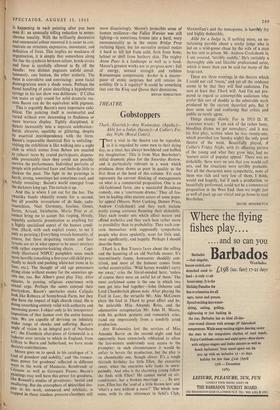THEATRE
Gobstoppers
Thark. (G a rrick .)—Any Wednesday. (Apollo.)— Alibi for a Judge. (Savoy.)—A Collier's. Fri- day Night. (Royal Court.) =HAT a visit to the theatre can be regarded, j_ as it is regarded by some men to their dying day, as a treat, has always bewildered and baffled my imagination.' This is from Max Beerbohm's initial dramatic piece for the Saturday Review, and is particularly relevant in a week which produces three shows as poor in quality as the first three at the head of this column. Yet each represents the current thinking of managements on what is a commercial proposition. One is an old-fashioned farce, one a successful Broadway comedy, one a 'courtroom drama.' They all fea- ture in leading roles mature actors of some popu- lar appeal (Messrs. Peter Cushing, Dennis Price, Andrew Cruikshank) and they each include pretty young actresses flaunting their dishabille. They each tender sets which affect nature and offend aesthetics and they each lean rather more to possibility than to probability. They each con- cern themselves with supposedly sympathetic people who dress opulently, want for little and, most significantly, end happily. Perhaps 1 should describe them.
Thark is a Ben Travers farce about the selling and the haunting of an old Norfolk manor. It's intermittently funny, howsoever shoddily con- trived, and most of the humour comes from verbal eccentricities. 'Wild horses wouldn't carry me away,' cries the literal-minded hero, 'unless of course there were an awful lot of them.' The most acclaimed scene is the one in which two men get into bed together—John Osborne and Lord Chamberlain please note. After playing the Fool in Lear, the versatile Mr. Alec McCowen plays the fool in Thark to great effect and he, the palatable Miss Amanda Reiss, and the adamantine octogenarian Mr. John H. Moore, with his gothick 'gestures and romantick cries, stand out impressively from a tawdrily acted production.
Any Wednesday lost the services of Miss Amanda Barrie on the second night and had apparently been extensively reblocked to allow the last-minute understudy easy access to the prompter; in such circumstances it would be unfair to berate the production, but the play is an abominable one, though clever. It's a tough thirtieth birthday for little Ellen, the executive sweet, when the executive wife looks in unex- pectedly. And who is the charming young fellow she finds with Ellen? He cannot mend an air- conditioner, but a broken marriage . . . In any case, Ellen has the 'soul of a little brown hen' and 'what's a nest without a mate?' The whole non- sense, with its chic references to Sybil's Club,
Maximilian's and the menopause, is horribly fey and highly deductible.
Alibi for a Judge is, if nothing more, an en- tertaining parable about a tetchy judge who is led on a wild-goose chase by the wife of a man he has sent to prison. Mr. Andrew Cr•uikshank is, I am assured, 'terribly cuddly.' He's certainly a thoroughly able and likeable professional actor, which is more than can be said for many of the large cast.
These are three evenings in the theatre which I could not call 'treats,' and yet all the evidence seems to be that they will find audiences. I'm sure at least that Thark will. And I'm not pre- pared to regard as contemptible audiences who prefer this sort of shoddy to the admirable work produced by the current theatrical pets. But it does seem sad• and confusing that critics and public so rarely agree.
Things change slowly. For in 1913 D. H. Lawrence wrote : 'I am sick of the rather bony, bloodless drama we get nowadays,' and it was his first play,, written when he was twenty-ofie, which provided (on Sunday night) the only good theatre of the week. Beautifully played, A Collier's Friday Night, with its affecting picture of the young and what they grow into, had no 'mature actor of popular appeal.' There was no dishabille, there were no sets that you would call sets, and the situations were terribly probable. Not all the characters were sympathetic, none of them was rich and very few of them, I think, would end happily, but if such a production, so beautifully performed, could not be a commercial proposition in the West End. then we might just as well all pack up our vitriol and go home to read Beerbohm.
DAVID BENEDICTUS






























 Previous page
Previous page